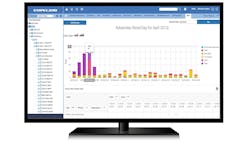Leveraging Refrigeration Performance Data to Drive Food Retail Cost Reduction
Keeping the Promise of Perishable Freshness
Maintaining reliable refrigeration is essential for any retailer whose business model is based on selling fresh perishable foods. Reputations are built on offering an ever-changing variety of fresh items, and fulfilling this promise is what keeps loyal customers coming back.
But running all refrigeration assets at optimum performance is a demanding proposition, especially across a large enterprise of stores. Maintaining proper temperature ranges helps to minimize food loss (i.e., shrink), maximize food quality, and protect food safety. When you factor in maintenance costs and high shrink rates, it’s easy to see how refrigeration issues could chip away at razor-thin profit margins.
This scenario was all too familiar for one leading international food retailer and its dedicated contractor network. Faced with rising maintenance costs and increasing demands to manage all aspects of preserving product quality, they needed tools to address refrigeration performance outliers and gain control of their extensive equipment and asset portfolios — across each store of their enterprise.
As a Copeland customer and user of its Connect+ enterprise management software since 2020, the retailer requested a solution for tracking the health and performance of refrigeration assets in every store. The resultant program exceeded expectations, yielding a 33% reduction in monthly service expenses.
Daily Maintenance Costs Add Up
Keeping perishables within designated temperature ranges is the key to preserving food freshness and maximizing shelf life. Challenges arose for our enterprise customer when some refrigerated display cases simply could not hold the required temperatures. Not only was this contributing to product shrink and lost sales, but more importantly, it was also negatively impacting customer experiences.
Every day, contractor teams responded to alarms popping up across the store network, rolling trucks to address the most urgent refrigeration repairs. But this purely reactive maintenance strategy was not sustainable in the long term for a variety of reasons:
· Service calls are often unnecessary and drive increased maintenance expenses;
· Individual alarm resolutions aren’t considered for their implications of larger or related issues;
· Not all alarms require on-site servicing; data is lacking to make accurate assessments;
· Service effectiveness is difficult to measure from performance and cost perspectives; and
· A one-size-fits-all approach to preventative maintenance is inherently inefficient.
The retailer needed a smarter approach that could help them be more proactive, data-driven and prescriptive in their maintenance efforts. Doing so would require having visibility to the individual performance of every case and refrigeration rack within every store of their retail network.
Implementing a Solution
Copeland’s Connect+ data science and software teams began developing a solution designed to provide customers with much-needed prescriptive and predictive insights into refrigeration performance at the enterprise level. Enter the Copeland Facility Health Score Insights tool, a new value-added service module that can be offered to existing Connect+ customers.
Copeland Facility Health Score Insights is an emerging solution that features a designated user interface (UI) which elevates critical equipment performance observations into an accessible dashboard and enables users to easily investigate issues in individual stores and assets. Stores and assets are assigned health scores to track their relative uptime metrics and health ratings. Upper and lower temperature boundaries are assigned to each refrigerated case using industry best practices, which represent standard temperature ranges for its respective perishable and frozen offerings.
Leveraging machine-learning algorithms to monitor equipment health data, the tool presents end users with intuitive, actionable information, including: store- and asset-level performance trends, reports and operational insights. Customer goals were to integrate the tool into its standard operating procedures (SOPs) — to triage alarms, troubleshoot and prioritize service calls — and leverage performance trends and data insights to prevent future issues.
Facility health score metrics include:
· Overall enterprise health;
· Individual store health;
· Case health and uptime;
· Percentage of rack capacity leveraged;
· Alarms summarized by enterprise, site, device and most common types; and
· Hours of food exposure to temperature excursions.
In the summer of 2023, the Copeland solutions team began a proof of concept of the Copeland Facility Health Score Insights solution. Selected pilot stores already used Copeland Connect+ and thus had the infrastructure required for enterprise data collection. The Copeland team conducted discovery and training sessions for the retailer and their contractor network, tailoring the solution to meet their specific needs, workflows and maintenance SOPs.
Delivering Operational Savings and Data-Driven Business Intel
At the conclusion of the two-month trial, the implementation of the Copeland Facility Health Score Insights solution had significantly transformed the retailer’s operations and improved refrigeration performance. The contractor network had fully adopted the alarm management dashboard as part of its daily SOPs, helping them to triage issues, drill down for diagnoses, and respond much more effectively — all of which drove rapidly declining refrigeration alarm counts and maintenance expenses.
According to a contractor team lead, the tool enabled them to narrow their focus to the most critical issues. “Our whole process has changed. Now we can log in and focus on what’s causing the most issues,” the contractor said.
The Copeland Facility Health Score Insights trial revealed that as scores improved, service costs were reduced. Prior to the trial period, the retailer had established a monthly baseline for service-related expenses across the enterprise. After two months, the solution helped them to reduce monthly service costs by 33% while delivering a variety of associated program benefits, including minimizing nuisance alarms and lowering overall alarm volume; reducing unnecessary service calls, work orders and costs; increasing operational performance in stores and assets; and eliminating at least one truck roll per store per month.
For the retailer, the tool gives them immediate visibility to their enterprise-, store- and asset-level health scores. To provide deeper insights, the Copeland data science team worked with the retailer and contractor to summarize the data they needed to generate monthly business reports — helping them to track key performance metrics and identify areas needing improvements. The reports are now part of their standard monthly and quarterly business metrics.
As a result of the successful trial, the retailer and contractor adopted the Copeland Facility Health Score Insights tool into their business and maintenance SOPs. Moving forward, the retailer noted that their near-term focus was to achieve stability in their alarm counts, with the long-term target to become even more proactive — and less reactive — in their maintenance programs.
“After we establish a new alarm baseline, we want to be much more proactive and leverage the case, rack and uptime scores to inform our decision-making and drive efficiencies,” they said.
About the Author
Stephanie Olson
Stephanie Olson is director of solutions architecture at Copeland. Olson is a customer-focused solutions and strategy leader with a unique blend of technical, commercial and consultative expertise. Skilled in building and leading teams that deliver innovative solutions to customers to improve their operational gaps and drive their success, she excels in navigating the gray areas, leveraging her analytical and strategic mindset with leadership, empathy and clear communications to influence stakeholders, drive revenue, and create structure.


